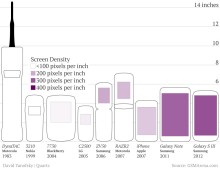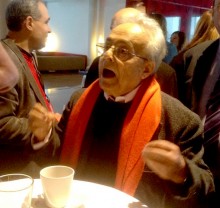We are all Youthful in our Own, Unique Way!
Posted in VideosApril 20, 2013No comments

Posted in Digital Media,Social MediaApril 10, 2013No comments

UAE telecom operator Etisalat has unblocked Skype, the VoIP calling service, in the UAE. Etisalat confirmed this via its social media accounts. “The long awaited app is finally available for all, Enjoy calling your long distance friends & family using #Skype,” the telecoms firm said. However, this isn't the first time that a Skype 'ban' has lifted in the UAE. The ban has seemingly been lifted on more than one occasion in the past, only to be blocked again.
Read More on
Posted in ReadingsApril 7, 2013No comments

New America Media ,
Op-ed, Ghassan Michel Rubeiz ,
Posted: April 5, 2013
Editor's Note: By the time Assad is deposed, the Syrian state might well disappear, argues commentator Ghassan Michel Rubeiz. Rubeiz, a social scientist and political commentator, is the former secretary of the Middle East for the Geneva-based World Council of Churches.
To save Syria’s sovereignty and avert wider regional instability, rebel forces should be urged to negotiate with the ruling regime of President Bashar al Assad. Serious political reform cannot be achieved on the battlefield of an escalating, sectarian civil war.
Washington’s siding with the rebels as it passively promotes the forceful removal of Assad has not worked out. By the time Assad is deposed, the Syrian state as we know it might well disappear.
Washington should discourage Saudi Arabia and Qatar from taking the lead in planning for the future of Syria. Moreover, Moscow must push Assad to accept radical reforms. Increased pressure, meanwhile, should be brought to bear on both the opposition and the regime toward achieving a settlement.
It is not inconceivable that under such an agreement, Assad could eventually be eased out nonviolently; he may already be considering ways to avoid facing the moral and practical implications of rebuilding a country destroyed on his watch. Even supporters of the regime would not want to keep Assad on the throne under such terms.
The cost of the status quo is too high. The war has already claimed more than 80,000 lives and displaced upwards of five million. Its effects are being felt beyond the country’s borders in Lebanon, Jordan and Iraq, not to mention Turkey and Israel, where the latest flare up with Palestinians is being partially blamed on the Syrian crisis.
In Lebanon, the half million Syrian refugees that have crossed into the country have added to an equal number of Palestinian refugees already there. Together, these two groups comprise a quarter of Lebanon’s entire population. In Jordan, Syrian refugees are upending demographics in the kingdom and adding to its instability.
It is also clear that neither side in the conflict is capable on its own of achieving a decisive military victory. While the uprising has lately scored small victories, government forces maintain dominant air power and the support of a significant part of the population.
The lingering stalemate, meanwhile, is beginning to take on a Cold War dynamic. In Damascus, Bashar al-Assad relies on Iran for military assistance and on Russia for political support. The Lebanese Hezbollah militia supports the Syrian regime by fighting the rebels inside Syria.
The opposition, meanwhile, depends largely on Saudi Arabia and Qatar for material, military and political aid. The United States and some European countries offer the rebels material assistance and diplomatic guidance, while Washington coordinates with Jordan and Israel to orchestrate an outcome favorable to their interests. The United States is also training Syrian rebels in Jordan.
Equally as troubling and in an echo of events in Libya, rebel forces in Syria have been infiltrated by a massive entry of foreign fighters financed largely by Arab donors. Their aim of establishing some form of post-Assad political stability is nothing but a mirage, a fact amply demonstrated by the outcomes in states swept up in the events of the Arab Spring. Any meaningful solution in Syria and these other nations will not come about without first integrating deep political and societal change.
More to the point, in Syria the outcome of sectarian civil war is sectarian state building.
Barring negotiations, the violence will likely continue to tear at the national fabric of what had long been a largely secular society. Sectarian killings, such as those increasingly seen in Iraq, are becoming more frequent.
Amid such violent devolution, fissures are erupting as ethnic groups begin to retrench. The ethnic Druze may be forced southward, near the Israeli occupied Golan Heights. The Alawites — to which the Assad family belongs – will look to retreat to their coastal district in the West. The three million Kurds in the northeast, the only group that aspires to “liberation” from the state in a post-Assad era, could exploit the deepening political vacuum by separating to form a “Syrian Kurdistan.”
The majority Sunnis — who form the bulk of the opposition — could end up occupying the central and larger part of the country. Their ranks are far from unified, though, as secular (nationalist and Ba’athist) and religious (Salafi and the Muslim Brotherhood) vie for control.
Negotiation between the opposition and the Assad government is the only viable means of stopping the bloodshed, preserving the nation’s sovereignty, and containing the sectarian tension.
Posted in Digital Media,TechnologyApril 3, 2013No comments

The first mobile phone call was made 40 years today, on April 3, 1973, by Motorola employee Martin Cooper. Using a prototype of what would become the Motorola DynaTAC 8000x, the world’s first commercial cell phone, Cooper stood near a 900 MHz base station on Sixth Avenue, between 53rd and 54th Streets, in New York City and placed a call to the headquarters of Bell Labs in New Jersey.
The substance of the call is lost to history, but it probably doesn’t compare to the first telegram (“What hath God wrought”), first telephone call (“Mr. Watson, come here, I want to see you”), or even the first text message (“Merry Christmas”). Cooper’s inaugural mobile conversation is remembered as, “I’m ringing you just to see if my call sounds good at your end,’ or something to that effect.”
Regardless, the call was a major step in the development of mobile technology, though it would take another decade for the DynaTAC to reach consumers and two more decades for cell phones to overtake land lines in worldwide usage. But today, “phone” is synonymous with “mobile phone,” and the latest trend is toward mobile devices that aren’t really phones much at all. Motorola’s mobile business, meanwhile, is now owned by Google.
Posted in Miscellaneous,PoetryMarch 30, 2013No comments

Posted in أنسي الحاجMarch 4, 2013No comments

العاجز عن الحبّ قد يعوّض بالحريّة، وهي بالفعل تُعوَّض، ولكنْ كمَن يهرب من مرآةٍ إلى مرآة ولا يرى إلّا الصورة التي أراد أن يتجنّبها. الحريّة أريَحُ من الحبّ، راحة الهائم الخاوي، ولكنْ إلى متى؟ هل يكتفي الهواء بأن يكون هواءً في مدى بلا بحر ولا نهر ولا شجر ولا كائنات؟ مَن يداعب عندئذٍ، مَن يلاعب، مَن يُحرّك، كيف يشعر بوجود نفسه؟ قد يلعب الهواء مع نفسه ليلتهي، كما يفعل النرجسي، لكن النرجسي بحاجة، ولو بين الحين والحين، إلى حطبٍ لمدخنته، إلى معجبٍ يلقم إعجابه بنفسه، يُجدّد نظرته العاشقة لنفسه، وإلّا جفّ وتفكَّكَ من الرتابة. الحريّة غير المتلاطمة العواطف، غير المسكونة إلّا بصاحبها، عُنوسٌ عنكبوتيّ حزين.
والهواء وحيداً يختنق.
Posted in أدونيسFebruary 28, 2013No comments

عن الحياة
Posted in Readings,أنسي الحاجFebruary 28, 2013No comments

Posted in أدونيسFebruary 12, 2013No comments

أيتها الصديقات، أيها الأصدقاء نجتمع من أجل ” سورية ديمقراطيّة “، ومن أجل ” دولة مدنيّة ” فيها، وفقاً لموضوع هذا المؤتمر. السؤال المباشر الذي يفرض نفسه، في هذا الصّدد، هو: هل نؤمن جميعاً أنّ الوسيلة جزء لا يتجزّأ من الغاية؟ إذا كان الجواب بالإيجاب، وهو ما أفترضه شخصيّاً، فإنّ علينا، أن نعترف بأنّ الوسائل العنفيّة المسلّحة القائمة، اليوم، إنّما هي وسائل تتناقض كلّيّاً وجوهريّاً مع هذه الغاية. إنّها بالأحرى، قضاءٌ على الديمقراطيّة والمدنيّة، عدا أنها لا تقيم أيّ وزن لحياة الإنسان ولحقوقه وحرّياته، إضافةً إلى أنها تحتقر تاريخه ومنجزاته العمرانيّة والحضاريّة. والحقّ أننا عندما ننظر إلى ما يحدث الآن في سورية، مربوطاً برمزيّتها التاريخيّة، على المستويين الحضاري والكونيّ، ندرك مباشرةً كيف أنّ الصراع فيها تحوّل إلى صراعٍ إقليميّ ودوليّ في آن، وكأنّ مقصد الجميع يتخطّى تهديم النّظام إلى تهديم سوريّة.
Posted in أنسي الحاجFebruary 10, 2013No comments

أنسي الحاج